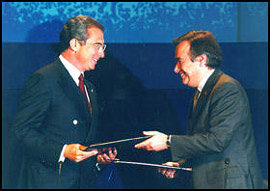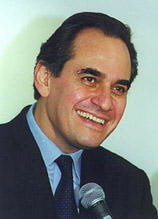 Mexico,
a Dynamic Member of Globalization Mexico,
a Dynamic Member of Globalization

If the economy keeps up at the rate it is going, it looks like Mexican President Ernesto Zedillo may achieve the biggest challenge he set out for his administration - to end the political term without a crisis. That means he would leave a legacy his predecessors were unable to for the last 25 years, and it would also sweeten politicians and investors alike to his other achievements.
Mexican President, Ernesto Zedillo Ponce and Portuguese Prime Minister, concluding the free trade agreement between the European Union and Mexico
Zedillo's strict monetary policy and efforts to widen privatization initiated by prior disgraced President Salinas de Gortari will ring clearer if his name is not marred by a trail of economic instability like the one Salinas left. But Salinas, despite his shortcomings, must be credited for greatly furthering Mexico on its path to become the great global exporter that it is.

Taking on the liberalization mantra that President Miguel de la Madrid introduced in the mid-1980s, Salinas signed Mexico's fate with the North American Free Trade Agreement (NAFTA). Since then, "With NAFTA, Mexico has become a strategic place to invest," Trade and Industry Minister, Herminio Blanco exclaimed. Latin America's sweetheart, whose liberalization honeymoon was stopped short when the devastating 1994 devaluation sent it back to its dating days, is winning investors hearts again. A step which Moody's investor rating agency recognized with its February upgrade of the nation's long-term sovereign debt to investment level.
|
All this against a backdrop of the most hotly contested elections that will determine in July if the Institutional Revolutionary Party (PRI)'s 71-year reign will continue or if a new power comes to the helm. Most recent polls show PRI presidential candidate Francisco Labastida running neck-to-neck with moderate Nation Action Party (PAN ) candidate Vicente Fox. Both propose to maintain similar economic platforms, and confess to be pro-free market, though they concede there is no turning back from liberalization, as if to suggest a nationalized economy were preferable to the advances that Mexico's approach to globalization has brought. Privatization of the nation's petrochemical industry, for example, which was not fully undertaken under the Zedillo administration, is a topic candidates have been forced to take a position on. Labastida, widely known to embrace old-guard party tactics has already made a pact with the oil-workers' union that he will not privatize the national oil monopoly, Pemex, in exchange for their votes. Fox, former president of Coca-Cola Mexico, only promises to put apt people in charge of the management of Pemex, moving away from the tradition of appointing a political ally to manage the nation's largest revenue generator. Whoever wins, investors seem content that the democratic apparatus is in working order. The transition of power which is infamous for leaving the economy in upheaval is expected to change its tune this time around.
President Zedillo and his economic team, headed by the Governor of Banco de Mexico (Central Bank), Guillermo Ortiz, and Finance Minister Jose Angel Gurria, have gone to lengths to prevent a devaluation following the change of administration. The measures seem to be making a difference. A floating exchange rate - in place since 1994 - has kept the peso from going drastically astray. Unlike the end of the previous administration in 1994, the Zedillo government has coordinated a $4.13 billion contingency IMF loan to fall back on, should there be need, and boosted international reserves to a record $30 billion level. Energy Minister Luis Tellez has been instrumental in bringing in higher oil revenue, when he helped orchestrate the output cuts with oil exporting nations in 1999 that led to skyrocketing prices not seen since 1991. Trade and Industry Minister Herminio Blanco has secured Mexico an even stronger position in the global trade world, pushing the trade deficit to low levels with increased exports. Contagion effects of the Asian and Brazilian crises that slightly set back Mexico's growth rate are distant memories now.
The Banco de Mexico 's latest forecast indicates that the nation's gross domestic product (GDP) will grow at an annual rate of 4.2% this year. Inflation when Zedillo stepped into office ran at a dizzying 49%, driven wild by the wave of rising interest rates when the peso crashed, but is expected to come in at one-digit this year. By 2003, the Banco de Mexico says inflation will be on par with its northern neighbor and biggest trade partner, the United States.
Almost three-quarters of Mexico's GDP depends on its export sector, of which 85% goes to the United States. Mexico is No.7 worldwide in terms of exporting power, with exports expected to total $130 billion this year, much more than double Brazil's total and almost equal to the sum of exports of all other Latin American countries. Signs of economic recovery are also evident in the 18% annual growth Mexican imports have seen in the last decade. |

